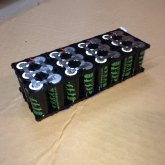Love.Sun
New Member
So I have decided to finally dive in and try to make a tiny system.
I am planning on taking either a NiMH or a Li-ion cell. A single cell will probably be enough.
Then wire it with a tiny solar charger in order to charge it. Literally trying to make one of those solar power bank chargers that people use for cellphones. But instead of buying it I wanna make it and learn stuff in the process.
For now I am questioning which battery to take. I saw on Reddit /r/batteries the other day, someone posted this guide https://techmoment.net/best-18650-battery/ about the 18650 li-ion batteries.
I initially thought of getting exactly that battery for my project but that article states that those batteries can be dangerous and I am afraid that if I need to solder wires to their ends that it might not be something I am capable of doing properly + the article says that you should never solder them. I find that hard to believe because those cells must be soldered together when they are used in some devices.
Either way those batteries seem like a potential trouble on one hand but on another they seem to have much higher capacity and voltage than the NiMH.
And from what I learned from a few people here on the forum is that I can get more Watt energy if I have higher voltage.
So if I use a 3000mAh li-ion with 3.6v I will get 10.8Wh if I am correct in my calculations.
If I use 2000mAh NiMH with 1.2v I will get only 2.4Wh.
I am inclined to work with the stronger battery but I am not sure if its smart considering my lack of experience.
I would still love to do this.
What are your suggestions? Maybe I am completely off here. Should I try something else or a battery with completely different chemistry??
I am planning on taking either a NiMH or a Li-ion cell. A single cell will probably be enough.
Then wire it with a tiny solar charger in order to charge it. Literally trying to make one of those solar power bank chargers that people use for cellphones. But instead of buying it I wanna make it and learn stuff in the process.
For now I am questioning which battery to take. I saw on Reddit /r/batteries the other day, someone posted this guide https://techmoment.net/best-18650-battery/ about the 18650 li-ion batteries.
I initially thought of getting exactly that battery for my project but that article states that those batteries can be dangerous and I am afraid that if I need to solder wires to their ends that it might not be something I am capable of doing properly + the article says that you should never solder them. I find that hard to believe because those cells must be soldered together when they are used in some devices.
Either way those batteries seem like a potential trouble on one hand but on another they seem to have much higher capacity and voltage than the NiMH.
And from what I learned from a few people here on the forum is that I can get more Watt energy if I have higher voltage.
So if I use a 3000mAh li-ion with 3.6v I will get 10.8Wh if I am correct in my calculations.
If I use 2000mAh NiMH with 1.2v I will get only 2.4Wh.
I am inclined to work with the stronger battery but I am not sure if its smart considering my lack of experience.
I would still love to do this.
What are your suggestions? Maybe I am completely off here. Should I try something else or a battery with completely different chemistry??



